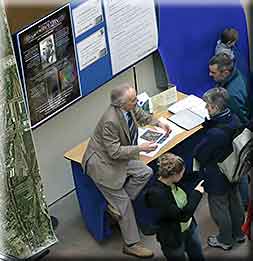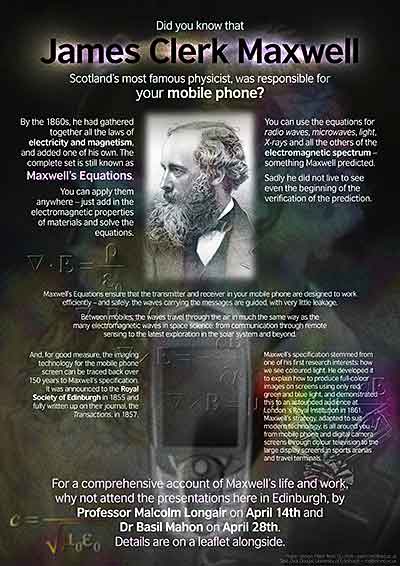|
|
James Clerk Maxwell
|
|
"James Clerk Maxwell was one of the greatest scientists who have ever lived. To him we owe the most significant discovery of our age – the theory of electromagnetism. He is rightly acclaimed as the father of modern physics. He also made fundamental contributions to mathematics, astronomy and engineering."
– the James Clerk Maxwell Foundation |
|
|
|
|
In the study of Einstein's Princeton home hung portraits of James Clerk Maxwell and Michael Faraday. Einstein regarded their work (along with that of Isaac Newton) as representing step changes in the way we understand the physical world. But it was Maxwell in particular who was to be an inspiration for Einstein: the nineteenth-century Scots physicist's electromagnetic field equations were to lead to the Special Theory of Relativity.
Dr Dick Dougal (opposite), one of the trustees of the James Clerk Maxwell Foundation, was on hand at SCI-FUN's event in the Hawthornden Court to explain to the public some of the links between Maxwell and current developments in science and technology. He used as an example of the breadth of Maxwell's work the mobile phone, a device whose sheer ubiquity hides the number of scientific and technological advances which have converged in its development, much of which are as a result of Maxwell's work. (The poster below, accompanying Dr Dougal's exhibition, summarised the key areas.)
|
|
|
|
|
|
|
|
| 2006 is the 175th anniversary of James Clerk Maxwell’s birth, and a variety of events have been planned, as described at the Maxwell Year 2006 site:
"A consortium of civic, university, learned society and educational bodies have planned a series of events during the year to bring the little known achievements of James Clerk Maxwell before young people and a wider general public. These events, in the form of lectures and dynamic demonstrations, will extend from April to October 2006 in city venues open to the public and in schools as well as other places with which he was associated."
|
|
|
|
|
|
A Brief Overview of Maxwell
|
|
|
More from the James Clerk Maxwell Foundation:
On the 13th June 1831 James Clerk Maxwell was born in Edinburgh, at 14 India Street, a house built for his father in that part of Edinburgh's elegant Georgian New Town which was developed after the Napoleonic Wars. Although the family moved to their estate at Glenlair, near Dumfries, shortly afterwards, James returned to Edinburgh to attend school at The Edinburgh Academy. He continued his education at the Universities of Edinburgh and Cambridge. In 1856, at the early age of 25, he became Professor of Physics at Marischal College, Aberdeen. From there he moved first to King's College, London, and then, in 1871, to become the first Professor of Experimental Physics at Cambridge where he directed the newly created Cavendish Laboratory. It was at the Cavendish, over the next fifty years, that so much of the physics of today continued to develop from Maxwell's inspiration.
|
|
-
Albert Einstein said: "The special theory of relativity owes its origins to Maxwell's equations of the electromagnetic field."
-
Einstein also said: "Since Maxwell's time, physical reality has been thought of as represented by continuous fields, and not capable of any mechanical interpretation. This change in the conception of reality is the most profound and the most fruitful that physics has experienced since the time of Newton"
-
Ivan Tolstoy, in his biography of Maxwell, wrote: “Maxwell's importance in the history of scientific thought is comparable to Einstein’s (whom he inspired) and to Newton’s (whose influence he curtailed)”
-
In 1864 Maxwell, before the Royal Society of London in 'A Dynamic Theory of the Electro-Magnetic Field', said: “We have strong reason to conclude that light itself – including radiant heat and other radiation, if any – is an electromagnetic disturbance in the form of waves propagated through the electro-magnetic field according to electro-magnetic laws.”
-
On which Professor R V Jones commented: “This paper is the first pointer to the existence of radiation other than light and heat, and ranks as one of the greatest leaps ever achieved in human thought.”
-
"He achieved greatness unequalled" Max Planck
-
"From a long view of the history of mankind – seen from, say, ten thousand years from now – there can be little doubt that the most significant event of the 19th century will be judged as Maxwell's discovery of the laws of electrodynamics" Richard P Feynman
So much of our technology in the world today stems from his grasp of basic principles of the universe. Wide ranging developments in the field of electricity and electronics, including radio, television, radar and communications, derive from Maxwell's discovery – which was not a synthesis of what was known before, but rather a fundamental change in concept that departed from Newton's view and was to influence greatly the modern scientific and industrial revolution.
The tallest mountain on Venus is named Maxwell Montes, in honour of James Clerk Maxwell. Rising 12km above the planet's average surface it's the only feature on Venus named after a male. (The rest are named after real or mythological females.)
|
|
|
|
Click here for a (suprisingly good) Wikipedia article, and here for a link to books on Maxwell's life and work.
|
|



